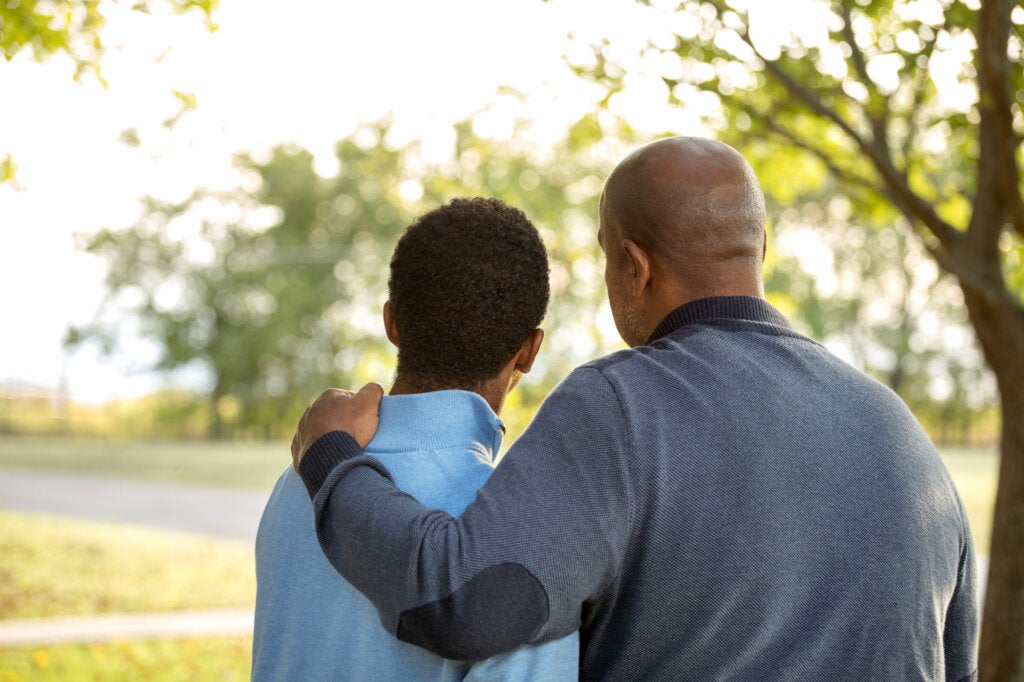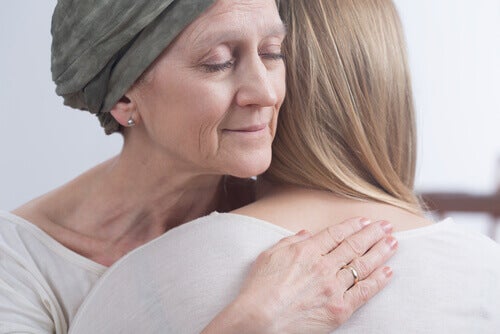Transmitting news of this nature isn’t easy, mainly because we’d never want to be the bearers of it. To the suffering caused by knowing that a child has such a serious illness, we must add the need to inform them what’s happening; therefore, it’s normal to hide the fact, be afraid, or simply not know how to tell your child that they have cancer.
For the American Cancer Society, age is a key point when it comes to what, when, and how to inform a child about the disease. They’re capable of understanding one type of communication or another depending on their level of cognitive and emotional development; depending on the evolutionary moment they’re going through, their brain will be prepared to process the information.
The bottom line is to tell the truth in a way that children can understand and prepare themselves for the changes that will occur in the family.
– American Cancer Society –
How do I tell my child that they have cancer?
The first recommendation is that you contact the professionals who made the diagnosis. They’ll know how to give you guidelines, and perhaps you can benefit from the psychology and psychiatry services of your hospital of reference. However, there are also a series of general guidelines to follow depending on the age of the minor.
According to the American Cancer Society, children need to know the following basic information:
- What will the treatment be like?
- Where in their body is it located?
- What can they expect to happen from then on?
- What’s the name of cancer (leukemia, brain tumor, central nervous system, lymphoma, etc.)
To do this, find a place, a quiet moment, and avoid distractions. The child may have questions for which they need answers. Take the time to respond and plan for possible interruptions to avoid awkward moments.
If you stop to answer the phone, turn off the stove, or take the dog out during the time your child is trying to have an open conversation, you may find it more awkward to try again.
– American Cancer Society –
We must stop to reflect on one point. You have to understand that each child is different because each family environment in which they grow up is also different. Some kids will understand what’s happening to them faster than others; this is normal.
Try to adapt the language and rhythm of the information to the particular characteristics of your child. However, the American Cancer Society establishes a general guide to transmit the bleak message:
Children from 0 to 2 years
At this age, children communicate primarily with tactile and visual messages; consequently, they find it difficult to understand the concept of cancer. It’s common for children between 0 and 2 years old to be afraid of being far from their reference figures. How can you explain to them what’s happening?
- Talk to them about what’s going on at the moment.
- Tell them about the procedures and medical tests before the day of the appointment arrives.
For example, let your child know that the needle will hurt a little and that it’s okay to cry.
– American Cancer Society –
- It’s comforting to the child to know that you’ll always be by their side.
- Tell them how long you’ll stay in the hospital and when you’ll return home.
- Look for attractive and fun ways to deliver the medicine. You can find help in books or videos that they like and use them during treatment.
It’s important to focus on what’s happening at this time because they may be afraid of medical tests and the pain they tend to cause.
Children from 2 to 7 years
At this age, children are capable of understanding cancer if simple concepts are used. They begin to observe and learn by paying attention to cause-effect relationships and, consequently, may blame the disease on a specific event such as not eating their vegetable. For example, “This happened to me because I didn’t eat my broccoli.”
At these ages, it’s also normal for children to feel fear if they’re away from their parents due to medical tests or stays at the hospital. So, how can you tell your child that they have cancer?
- Let them know that you’ll be there for them in the hospital and at home when they need you.
- Make sure the child understands that cancer isn’t a punishment for any of their actions.
- Make sure your little one’s caring team treats them well and offers them options and rewards.
- Convey to your child that they need treatment that will alleviate the pain they’re feeling. Say that the goal of the medication is to help them get stronger.
- Explain procedures, techniques, and tests before they happen. Also, tell them that doctors sometimes have less painful ways of doing tests.
- Try to use simple constructions, such as “some cells are good, and some are bad” to teach what cancer is. You can tell them that there’s a competition between said cells.
If your child is 5 years old, you’re going to tell them that cancer is a little ball that grew in you or it’s an enemy cell that’s growing in your blood and we’re going to fight against it.
– Doctor Sanchez –
Children from 7 to 12 years old
At this age, minors are capable of a basic understanding of the concept of cancer. They conceive of it based on their symptoms and in reference to the activities that are difficult for them to do compared to other children. They understand that medicines help them feel better.
At this stage, it’s also normal for them to be afraid of pain, and it’s likely that they turn to other sources of information, such as school, television, or the internet, to understand what’s happening to them. How should you speak to them? Let’s see below:
- Explain the cells that cause cancer as ” the cells that cause problems.”
- Let them know that their body has different types of cells with different jobs to take care of and that the “problem” cells are “causing problems” for the good cells; It’s for this reason that they’re undergoing treatment: Because the doctor will help them fight the “cells that cause problems.”
- Talk to them about how it’s normal to get nervous, fed up with procedures, or cry. It’s okay to feel this way.
- Explore if they’ve heard or searched for information about cancer anywhere outside the hospital and address their concerns. It’s important to ensure that the minor has accurate information.
The doctor is the hero of your disease, they’re the only one who knows, because they’ve seen inside of you. The internet knows about other people, but not about you. If you have a question, we can call the doctor at any time and they’ll answer us.
– Doctor Sanchez –

Children 12 years or older
From the age of 12, adolescents are already capable of understanding more complex concepts and imagining things that haven’t happened to them. They play with fantasy, and because of this, they may have many questions.
They think of their disease in terms of symptoms and understand that medications are allies in combating them, but they may also be concerned about physical side effects, such as hair loss or weight fluctuations. In addition, they may want to participate in decision-making. So, how do you tell your teenage child that they have cancer?
- Explain the diagnosis as a disease in which there are cells that go wild and, consequently, grow very large and very fast. These wild cells are known as cancerous by doctors and get in the way of the proper functioning of the body.
- Medical treatment will kill the wild cancer cells and the symptoms will disappear so the body will work well again.
- Clarify procedures, tests, and their side effects.
- Talk to the teen about their concerns, emotions, thoughts, and fears.
It’s better to be honest about the knowledge you have. You can say: “There’ll be things that I don’t know, but we can always address our questions with the doctors.”
– Doctor Sanchez –
It’s normal for these situations to overwhelm us, and it’s difficult for us to find a way to focus on them and deal with them. There are professionals who’ve been guiding people through challenges of this type for years, including doctors, nurses, psychologists, social workers, etc. We encourage you to contact them.
The post How Do I Tell My Child that They Have Cancer? appeared first on Exploring your mind.



















Comments